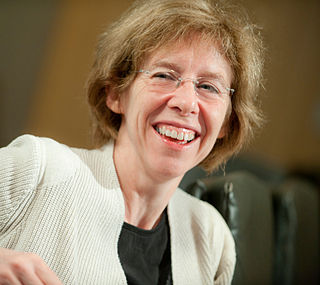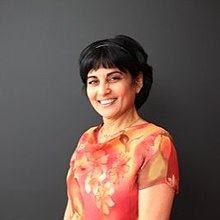
The Royal Prince Alfred Hospital is a large teaching hospital in Sydney, Australia, located on Missenden Road in Camperdown. It is a teaching hospital of the Central Clinical School of the Sydney Medical School at the University of Sydney and is situated in proximity to the Blackburn Building of the university's main campus. RPAH is the largest hospital in the Sydney Local Health District, with approximately 1200 beds. Following a $350 million redevelopment, the perinatal hospital King George V Memorial Hospital has been incorporated into it.

Elizabeth Helen Blackburn is an Australian-American Nobel laureate who is the former president of the Salk Institute for Biological Studies. In 1984, Blackburn co-discovered telomerase, the enzyme that replenishes the telomere, with Carol W. Greider. For this work, she was awarded the 2009 Nobel Prize in Physiology or Medicine, sharing it with Carol W. Greider and Jack W. Szostak, becoming the first Australian woman Nobel laureate.

Dianne Virginia Judge is a former Australian politician, who was a member of the New South Wales Legislative Assembly representing Strathfield for the Labor Party from 2003 until 2011.
Viera Scheibner is a Slovak-Australian anti-vaccination activist and retired geologist. From 1958 until 1968 she was assistant professor in the department of geology at Comenius University, Bratislava. Since her retirement from the Department of Mineral Resources, New South Wales, Australia in 1987, Scheibner has been active in the anti-vaccination field, writing and giving lectures opposing vaccines and vaccinations.

Linda Jean Burney is an Australian politician, a member of the Australian Labor Party (ALP) and the member of Parliament (MP) for the division of Barton since 2016. She was the minister for Indigenous Australians from 2022 to July 2024. She was formerly a member of the New South Wales Legislative Assembly (MLA) for the district of Canterbury from 2003 to 2016 and previously a teacher. Burney is the first known woman to identify as Aboriginal to be elected to the Australian House of Representatives.

Elaine V. Fuchs is an American cell biologist known for her work on the biology and molecular mechanisms of mammalian skin and skin diseases, who helped lead the modernization of dermatology. Fuchs pioneered reverse genetics approaches, which assess protein function first and then assess its role in development and disease. In particular, Fuchs researches skin stem cells and their production of hair and skin. She is an investigator at the Howard Hughes Medical Institute and the Rebecca C. Lancefield Professor of Mammalian Cell Biology and Development at The Rockefeller University.

Verity Helen Firth is an Australian university executive and former politician. She is the Pro Vice-Chancellor at the University of Technology Sydney. She was the chief executive officer of the Public Education Foundation in Australia.
Suzanne Cory is an Australian molecular biologist. She has worked on the genetics of the immune system and cancer and has lobbied her country to invest in science. She is married to fellow scientist Jerry Adams, also a WEHI scientist, whom she met while studying for her PhD at the University of Cambridge, England.
The Cancer Institute NSW Premier's Awards for Outstanding Cancer Research are the premier awards ceremony for the cancer research sector in NSW. Now in its tenth year, the event honours the achievements of the individuals and teams that work across the cancer research sector to lessen the impact of cancer for the people of NSW.

Fiona Watt, is a British scientist who is internationally known for her contributions to the field of stem cell biology. In the 1980s, when the field was in its infancy, she highlighted key characteristics of stem cells and their environment that laid the foundation for much present day research.
Marie Ann Ficarra is an Australian politician who was a Liberal Party member of the New South Wales Legislative Council from 2007 to 2015. She was previously a member of the New South Wales Legislative Assembly for Georges River, but was defeated during the landslide election of 1999. She was the Shadow Minister for the Environment for the New South Wales Opposition.

The Centenary Institute of Cancer Medicine and Cell Biology, commonly referred to as the Centenary Institute or Centenary, is an Australian medical research institute located at the Camperdown campus of the University of Sydney, in Sydney, New South Wales. The research programs at Centenary focus on a diverse range of human health issues including cancer, cardiovascular disease, genetic diseases, immunology, infectious diseases and liver disease.

Katharina Gaus was a German-Australian immunologist and molecular microscopist. She was an NHMRC Senior Research Fellow and founding head of the Cellular Membrane Biology Lab, part of the Centre for Vascular Research at the University of New South Wales. Gaus used new super-resolution fluorescence microscopes to examine the plasma membrane within intact living cells, and study cell signalling at the level of single molecules to better understand how cells "make decisions". A key discovery of Gaus and her team was how T-cells decide to switch on the body's immune system to attack diseases. Her work is of importance to the development of drugs that can work with T-cells in support of the immune system.
Michelle Haber is an Australian cancer researcher in the field of childhood cancer research.

Bronwyn "Bronnie" Taylor is an Australian retired politician. She was the New South Wales Minister for Women, the Minister for Regional Health, and the Minister for Mental Health in the Perrottet ministry, from December 2021 to March 2023. Taylor had served as the Deputy Leader of the National Party in New South Wales from October 2021 until June 2024. She was a Member of the New South Wales Legislative Council from 2015 until 2024, representing The Nationals.

Jennifer Kathleen Aitchison is an Australian politician in the New South Wales Legislative Assembly as member for Maitland for the Labor Party at the 2015 New South Wales state election. She has served as the Minister for Regional Transport and Roads in the Minns ministry since 2023.

Elizabeth M. Jaffee is an American oncologist specializing in pancreatic cancer and immunotherapy.
Maria Kavallaris is an Australian scientist, based at the University of New South Wales' Children's Cancer Institute, where she is best known for her contributions to the field of cancer research. On 25 January 2019, Kavallaris was appointed a member of the Order of Australia.
Susan J. Clark is an Australian biomedical researcher in epigenetics of development and cancer. She was elected a Fellow of the Australian Academy of Science in 2015, and is a National Health and Medical Research Council (NHMRC) Senior Principal Research Fellow and Research Director and Head of Genomics and Epigenetics Division at the Garvan Institute of Medical Research. Clark developed the first method for bisulphite sequencing for DNA methylation analysis and used it to establish that the methylation machinery of mammalian cells is capable of both maintenance and de novo methylation at CpNpG sites and showed is inheritable. Clark's research has advanced understanding of the role of DNA methylation, non-coding RNA and microRNA in embryogenesis, reprogramming, stem cell development and cancer, and has led to the identification of epigenomic biomarkers in cancer. Clark is a founding member of the International Human Epigenome Consortium (IHEC) and President of the Australian Epigenetics Alliance (AEpiA).
Romano Cesare Pirola is an Australian pancreatology researcher and gastroenterologist. He is a co-founder of the Pancreatic Research Group at the University of South Wales which is credited as the first research group to describe pancreatic stellate cells.












